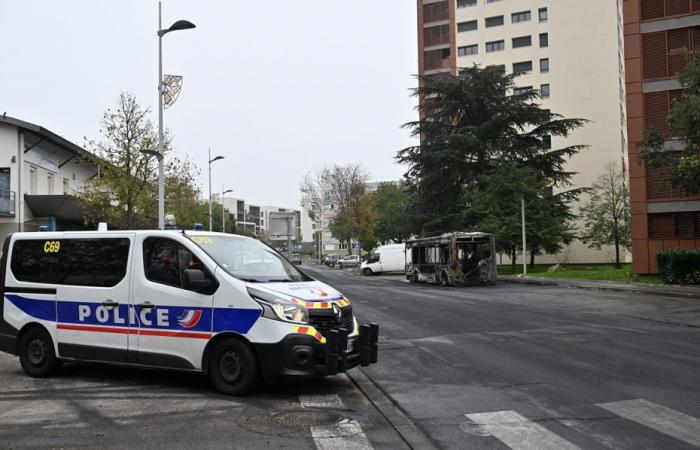Alexandre Vincendet, the mayor of Rillieux-la-Pape, summoned the families of the minors arrested during the urban violence of October 31 and November 1. He reserves the right to evict them from their social housing.
Company
From daily life to major issues, discover the subjects that make up local society, such as justice, education, health and family.
France Télévisions uses your email address to send you the “Society” newsletter. You can unsubscribe at any time via the link at the bottom of this newsletter. Our privacy policy
After urban violence, sanctions. While a first conviction was handed down on Monday, November 4, following the damage committed during the nights of October 31 and November 1, the mayor of Rillieux-la-Pape indicated that he reserved the possibility of evicting the families minors sentenced from their social housing in the long term. If implemented, this measure would be a first in France. But for the moment, its legal framework seems uncertain.
The mayor (Horizon) of Rillieux-la-Pape, Alexandre Vincendet, uses all the weapons at its disposal to respond to acts of urban violence, even if it means innovating. On May 24, he passed a deliberation which authorized him to cut the various financial aid provided by the city, and to evict the families of juvenile delinquents from their social housing. Some of these provisions have already come into force.
These sanctions occur on a case-by-case basis, explains Vincent Matter, ahousing policy deputy : “we act responsibly, in stages, not blindly. First, we wait until the individuals concerned are definitively convicted by the courts. Then, we summon the parents and offer support for their child. Depending on the seriousness of the facts, and if we find that our proposals are refused, we can start eviction proceedings.” The families of the young people arrested during the last nights of urban violence are therefore entering the first stage of this process: the summons by the town hall.
Other files are being investigated, but for the moment, no eviction has yet taken place, the process being complex to put in place. Social housing leases are the sole responsibility of the social landlord. The town hall assures that it works constantly with the latter, and that it will implement its requests. However, the legal aspect seems fragile.
The town hall relies on already existing grounds of law in the matter, such as “the misused use of housing”, which allows a tenant to be legally evicted. “This pattern seems tricky to use”, believes Benoît Content, lawyer specializing in real estate law. “The disturbance of public order does not seem to me to correspond to misuse of housing, since the offenders act outside it. A priori, i“The tenant would have to fail to fulfill the obligations provided for in the lease in order to be able to evict him.”
The expulsion procedure must be validated by the litigation and protection judge. It is he who could refuse the expulsion request, if he considers that it does not comply with the law. He should soon make a decision, as certain eviction requests have already been issued by the town hall.
The municipal team nevertheless brushes aside legal doubts and affirms that evictions will indeed take place. “There are eviction procedures currently underway for previous convictions, so it could go very quickly. In a few months, a first family should be evicted,” assures Vincent Matter, the housing deputy.
Furthermore, in concrete terms, the town hall is already involved in all new allocations of social housing: “I look at 100% of new requests for social housing with the lessor. Any request from persons unfavorably known to the competent authorities may be refused. We study each attribution with a very precise and clear eye. he insists.
Theoretically, families who see their file refused could appeal to the disputes judge, guaranteeing the risk of discrimination. But in practice, few families whose files are refused take this type of action. On the other hand, associations could mobilize. The Right to Housing 69 collective has already reacted, Monday, November 4, following the announcements of the mayor of Rillieux, indicating that it will “available to threatened families”.
Another aspect of the city's intervention is the possibility of cutting the financial aid it pays to the families concerned. This provision was passed at the same time as that providing for the possibility of intervening in social housing. On this aspect, the town hall faces fewer legal obstacles, and is already applying its policy. Families of convicted minors who refuse the support offered by municipal services for their children may thus find themselves deprived of food aid, assistance with obtaining a driving license, or access to leisure activities, for example, issued by the city. .
Other municipalities exercise a similar policy in France. In certain cases, their sanctions are contested in court: in March 2023, the administrative court of Versailles, seized by the Human Rights League, had thus canceled such a sanction pronounced by the city of Poissy, the measure being considered too general. Rillieux has not yet seen his measure legally challenged. The law does not necessarily oppose this: “it is possible to suspend or stop aid of this type, but in very specific, very clear cases”, explains Maître Content, lawyer at the Lyon and Bourg-en-Bresse bar.
Reactions after the announcement by the mayor of Rillieux-la-Pape: report by Mathieu Boudet and Amandine Poncet (Sunday November 3)
duration of video: 00h01mn44s
The mayor of the town of Rillieux-la-Pape, in the metropolis of Lyon, reserves the possibility of evicting from their social housing the families of delinquents convicted for the urban violence that occurred on October 31 and November 1.
•
©Mathieu Boudet / Amandine Poncet / FTV
Beyond legality, the mayor also sends messages : “When you have a child who is a minor, he or she is the responsibility of his or her parents. It is not the elected officials who educate them, not the teachers, not the police. First of all, it's the parents.” he explained on the set of France 3 Rhône-Alpes, the day after urban violence. He believes he is getting ahead of measures that could be implemented in the future on the national territory. Draft laws relating to the possibility of evicting families of juvenile delinquents from their social housing were in fact recently discussed at the Ministry of the Interior, and could come back to the forefront in the coming months.






